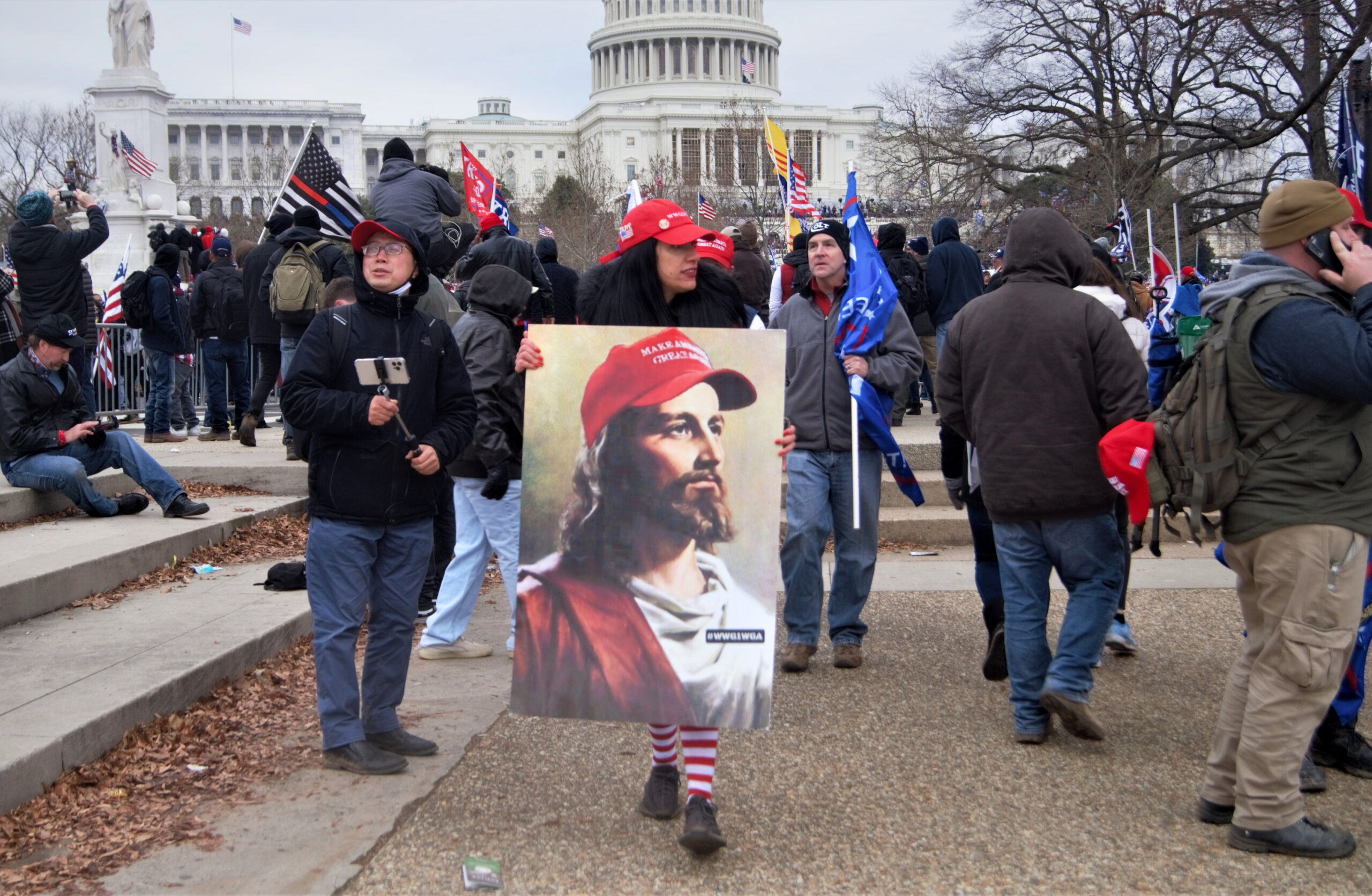‘God and country’ has become a toxic mix in the United States. Can they be uncoupled?
I was a graduate student in California when I realized that some white American evangelicals decouple their authoritarian views from the type of jingoistic American Christianity that rose to prominence during the early Cold War. I no longer considered myself evangelical by then, but I didn’t tell most of my family, and I still attended church occasionally, particularly when I visited my parents in Indiana. During a conversation about the “God and country” fusion I grew up with (it is now widely called Christian nationalism), my dad said, “You know, you might be surprised, but Pastor Matt* is very critical of all that God and country stuff. For him, God should absolutely come first, and it’s idolatrous to put the nation on the same level.”
I’ve been thinking about what my dad said that day in light of the response from “respectable” evangelicals to the prominent role Christian nationalists played in the January 6 insurrection, in which evangelicals carrying “Jesus 2020” banners and Christian flags participated alongside overt white supremacists displaying Confederate and Nazi symbols. Instead of asking why the vast majority of white evangelicals have so readily made common cause with white nationalists throughout the Trump years, up to and including the events of January 6, respectable evangelical commentators have now chosen to focus on Christian nationalism, full stop, as the problem that needs addressing in evangelical communities. Conveniently, this allows them to avoid looking deeper at the authoritarian theology that upholds the systemic racism, sexism, and anti-LGBTQ animus underlying evangelicalism.
Not too long before that conversation with my dad, I walked out of one of Pastor Matt’s sermons when he sneeringly equated Islam with terrorism. I was thus surprised to hear that the pastor wasn’t all-in for God and country jingoism. This was, after all, post-9/11 America, when the Bush administration encouraged evangelicals “to deepen their faith’s embrace of nationalism and American exceptionalism,” according to Anthea Butler, who is an associate professor of religious studies and Africana studies at the University of Pennsylvania. She describes the period between 9/11 and the election of Barack Obama in her new book, White Evangelical Racism: The Politics of Morality in America, as a time in which “the seeds of that racialization [of Islam] were planted.”
From my personal perspective, it certainly was odd to see a display of brazen Islamophobia, which was simultaneously a clear expression of xenophobia, from a pastor who reportedly scoffed at patriotic sentiment. Today, it seems to me that some evangelicals are focusing on the Christian nationalism of their coreligionists precisely as a means of obscuring the bigotry that underscores it, which has deep roots in evangelical subculture and history. In fact, popular author and speaker Beth Moore set the tone here in response to the “Jericho March” that took place in Washington on December 12, 2020, tweeting, “I have never seen anything in these United States of America I found more astonishingly seductive & dangerous to the saints of God than Trumpism. This Christian nationalism is not of God. Move back from it.” In a subsequent tweet, she called Christian Trump support “idolatry.” Moore recently announced she is leaving the Southern Baptist Convention, although she apparently remains a conservative evangelical.
While we will have to wait and see how far Moore’s convictions may ultimately carry her, attempts to address the harm done by conservative Christianity are bound to fail if they only address expressions of nationalism. One can see the weakness of this approach in Bonnie Kristian’s February 25 column for Christianity Today titled, “Are Christian Schools Training Christians or Americans?”
The column responds to an article of mine for Religion Dispatches, in which I point that out that many of the Capitol invaders, including the notorious Proud Boys, were animated by ideology that was recognizably evangelical. My argument is that Christian schools, Christian homeschooling, and evangelical churches can and often do foster extremism and radicalization. Kristian admits there is some truth to the claim and argues that Christian schools should address the issue by eliminating the widespread practice of reciting three pledges every morning—to the American flag, the Christian flag, and the Bible. Because public schools also instill nationalism with daily recitations of the pledge of allegiance to the American flag, however, she sees them as no better on this front than Christian schools.
In my view, eliminating the practice of pledging in schools—public or private, sectarian or secular—would be a good thing. I don’t think that children should become pawns in their parents’ disagreements about the meaning of patriotism, or that children who feel uncomfortable reciting pledges should be made to choose between participating in the ritual or feeling alienated from their peers. But the issues with evangelical and fundamentalist schools, which are usually called Christian schools or Christian academies, run so much deeper. For starters, the isolation of children in an ideologically homogeneous conservative Christian environment is harmful.
In Christian schools, students are taught that the schools’ prescribed understanding of Christianity is the absolute truth and that it is their duty to help their community gain the political power to “make the nation obedient to God” in accordance with “the biblical worldview.” In other words, they are taught to reject pluralism and to pursue social domination, imposing their sectarian standards of morality on others, primarily by banning abortion and depriving members of the LGBTQ community of rights. Likewise, Christian schools frequently make headlines for racist incidents, which do not arise in a vacuum. Strikingly, Kristian’s article does not once mention the terms “white,” “race,” or “racism.”
Public schools have their flaws, but they are better suited than their Christian counterparts in preparing children to embrace pluralism and diversity. A healthy democratic society is one composed of people who respect the dignity and human rights of those who are different from them. Exposure to diverse ideas and views helps children develop their own personalities and strengths and values. In Christian schools, children are forced to accept “alternative facts” about science and history, and to conform to ideologies that may negate their identities, which can result in trauma and long-term psychological damage (see also: queer people in evangelical environments). On this point I would direct readers to the work of journalist Rebecca Klein, who describes the Abeka and Bob Jones textbooks commonly used in Christian schools as having “overtones of nativism, militarism and racism.” Klein notes, for example, that the textbooks represent Nelson Mandela as a “Marxist agitator” and denounce the “radical affirmative action” of post-apartheid South Africa, in addition to downplaying the harm and long-term consequences of slavery in America.
Cindy Wang Brandt, an author, parenting expert, and ex-evangelical, was educated at a Christian missionary school in Taiwan. She sees a direct connection between conservative, mostly white evangelicalism and the colonialism and systemic racism that she experienced as a Taiwanese child in a Christian school. Brandt contends that it is impossible to separate the way Christianity is taught from the culture and unconscious biases of those who are teaching it. In practice, Christian teachings and interpretations of the Bible “are delivered by human beings enveloped and shaped by their cultural influences,” she says. Brandt believes it is possible for parents to teach children their religion without indoctrinating or coercing them; in fact, she considers indoctrination to be spiritual abuse. But Christian schools are sites of indoctrination, whereas formal education, according to Brandt, should “give a child tools to investigate the world and to find their place in it with their own agency.”
Reflecting on her experience in the missionary school, Brandt writes that she was taught “to become fearful of [her] own culture.”
I was taught to reject our dearly held values of respecting our elders, with Scriptures quoting Jesus saying we should reject our mother and our father. I was evangelized with the gospel of Jesus Christ by white Americans. When they taught us things of the Christian faith, it was always this is what it means to be Christian, without any acknowledgement that perhaps some of their values have been influenced by white American culture. The result is that I grew to understand that to be white is to be godly, and vice versa. My own culture was colonized out of me as a child taught to follow Jesus Christ.
If “respectable” evangelicals want to engage in good faith with people like me, who have left the fold and who write critically about the Christian education we received, they must grapple honestly with the deeper issues of supremacism, racism, misogyny and anti-LGBTQ animus that underlie the Christian nationalism we all saw at the January 6 insurrection. Even if a large number of evangelical pastors and educators were willing to confront superficial expressions of nationalism in their communities, the deeper biases and supremacist theology that animates these communities would remain. Addressing those issues is going to take more than hand-wringing about white Christian Trump support or giving up the practice of pledging allegiance to the American flag.
* Name changed.



